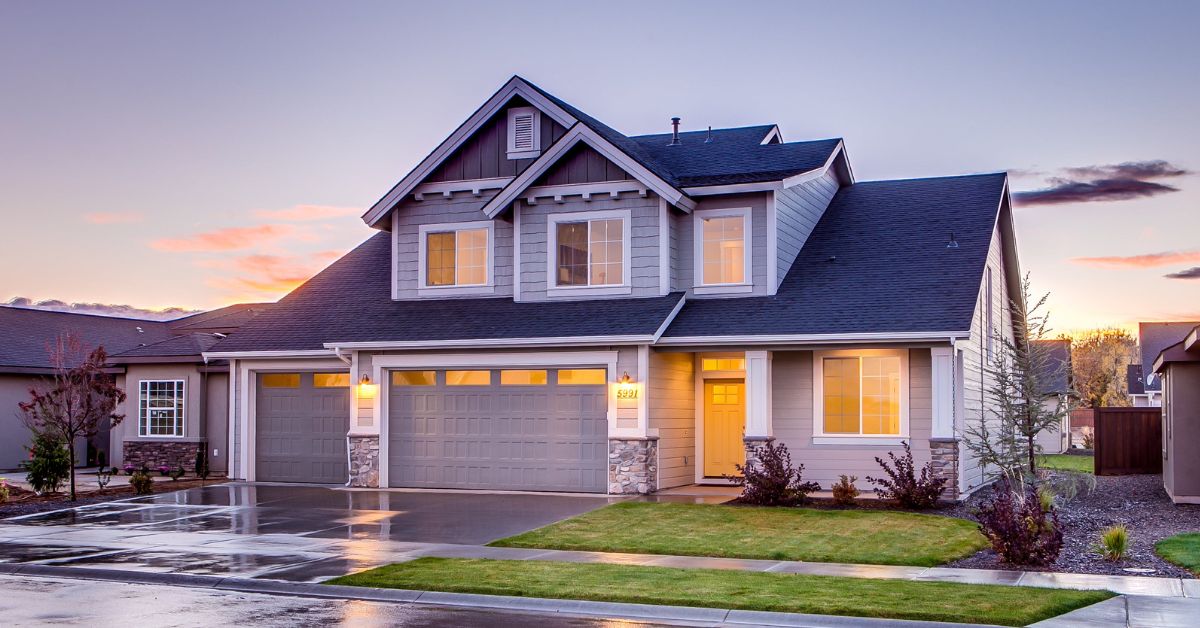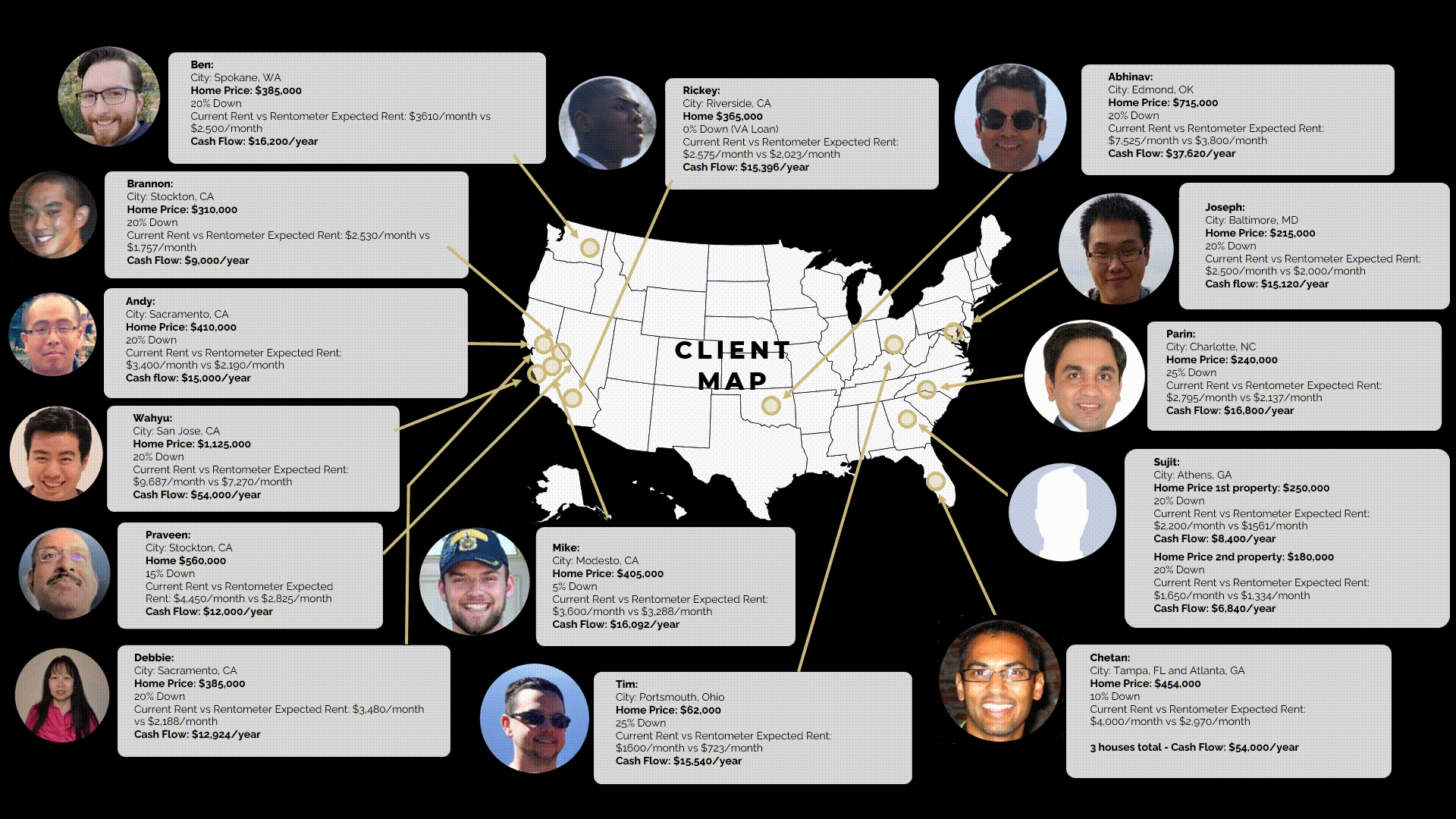Thinking about buying real estate? Then maybe you’re wondering, “Is it a good time to buy rental property right now?”
The short answer is… It depends on a few different factors.
So, keep reading – that’s what you’re going to learn about in this article.
Let’s get started!
Is it a good time to buy rental property in 2024?
Earlier I said that whether right now is a good time to buy property really depends. So, what does it depend on exactly? Here are a few things to consider:
High interest rates
Right now, interest rates are up. That means that if you’re thinking of buying a property just to live in it, you’d be saddled with a higher interest rate than usual.
For example, 30-year fixed mortgage rates more than doubled between January 2020 and January 2023 (from 3.72% to 8%).
You’re not making money on your property if you live in it, so it would be a liability.
On the other hand, if you buy property to rent it out, that’s an investment that could become an asset rather than a liability.
In that scenario, the rental payments you’d receive could cover the cost of your mortgage – and then some.
As an example, let’s say your mortgage payment for a two bedroom home is $1,000 every month.
If you live in your property, that means you’ll be paying the $1,000 per month yourself.
But, if you decide to rent it out, you could end up with positive cash flow.
For example, the strategy I like to use is a student housing model. So if you rent to students using this rent-by-the-room model, you could charge between $500-$700+ per bedroom and end up with positive cash flow.
(I talk more about renting to students specifically right here.)
Lower house prices
One of the consequences of high interest rates tends to be that fewer people want to buy houses. So, what does that mean for you, as a prospective buyer?
A few things…
First, since people don’t want to pay more than they otherwise would for a property, there’s little competition coming from other buyers.
And second, the people who are selling a property right now are much more likely to be willing to negotiate the sale price.
For example, I negotiated the price of a house I bought from $450,000 down to just $367,000.
By negotiating with the owner, I saved 18.4% on that deal thanks in part to the state of the market.
I explain more in this video:
And here’s the thing…
My mortgage payment on that property is $2,200 per month.
But even after subtracting my expenses, my cash flow is $3,660 per month. By renting out bedrooms with shared living spaces, I end up with plenty of cash flow that I can reinvest into other properties.
So, bottom line here: Buy when no one else is. Just as Warren Buffett says: “Buy when there is blood in the streets. Even if that blood is your own.”
(Note, though, that house prices seem to be rising again in certain markets. However, all this is to say – even an economic downturn can be a good time to buy an investment property.)
If you choose a property that can give you cash flow, you’ll be able to do things like:
- Pay down your mortgage
- Get tax benefits
- Potentially get property appreciation over time
Ultimately, you want to be able to cover your mortgage while earning passive income. Let’s talk more about how to do that…
Your cash flow
To make sure you don’t lose money on a real estate purchase, calculate your fixed expenses (like your mortgage and maintenance costs) and how much rental income you can expect.
Whatever is left over after you’ve subtracted your expenses is your cash flow.
And here’s the good news: By having your tenants sign a lease, you’ll be able to count on that set cash flow for the duration of the lease – even if housing prices go down in the meantime.
Your own financial situation
If you found a great property right now, could you afford the down payment?
If not, now is not the right time to invest. Instead, work on getting to that place where you have enough money.
For example, before I started investing in real estate, I worked as a Pharmacist, and I actually saved half of my income to be able to invest later on.
Now, I’m making enough from real estate that I was able to retire in my early thirties.
So, here’s my advice: Focus on advancing in your career and paying down debt (if you have any).
If you’re not earning enough yet, look for ways to increase your income so you can put more money toward future investments.
I talk about how to invest in real estate based on your situation in this video:
The type of property you invest in
Some properties come with more risk than others.
For example, renting to single families is not the best type of investment. And there are a few reasons why.
For one thing, renting to one family (versus renting individual rooms to different people) means that if your only tenant stops paying rent, you won’t have another income stream from real estate to fall back on.
Another downside?
You’re much more limited about how much income you can earn if you rent an entire property to one person.
For instance, let’s say your property is a three-bedroom, two-bath house. If you rented it out to a family, you’d have to charge for the property as a whole. And that brings the price down.
But, if you decide to rent by the room to students, you could charge competitive rates compared to what the local university charges for their room and board.
Another factor that makes renting to students less risky is that historically, when the economy is struggling, more people go back to school to re-skill or up-skill so they can stay competitive in the workforce.
So, by targeting students and renting out by the year, you can help ensure your rentals stay occupied – while maximizing your returns.
Benefits of real estate investing
Okay, what are some key benefits of investing in real estate?
Here are a few big ones:
Passive income: Once you have a system in place for finding tenants (or you’ve hired a property manager to take care of everything for you), the rental income will come in each month without any active work on your part.
Financial freedom: Want to quit your job? Retire early and travel? Spend more time with your family? Whatever your goals are, having real estate investments that pay your bills can give you a lot of options.
That’s why many of my students decide to invest in real estate. They want to build wealth that can help them find so much more freedom in life.
For example, Chetan has built up a positive cash flow and is builidng up a portfolio of properties:
Helping people by offering quality accommodation: Whether you rent to high-achieving college students or healthcare workers, offering people great housing can be really gratifying. Not only can you gain financial security through real estate for yourself and your family, but you can also help people who need affordable housing in the process. It’s a win-win.
Alright, now let’s talk about the future of real estate and where the market is headed.
How will the real estate market develop?
As an investor, you should look at market forecasts so you can plan your real estate investments accordingly.
So, with that in mind, here are a few projections to know about:
- Increased supply of properties on the market: As new properties get built and put on the market, the shortage we’ve seen over the last few years will likely decrease.
- Higher property prices: Property prices will most likely continue to rise over the next few years.
- Higher mortgage rates (for now): Mortgage rates will likely remain high, but they will most likely gradually go down over the next few years.
All of those are important factors to consider when you’re investing in real estate.
Okay, up next: Let’s talk about property location.

Where should you buy rental property in 2024?
The market you choose to invest in can affect your returns, so make sure you do some research before you buy anything.
Personally, I recommend investing in markets where home prices are on the lower end.
Here’s why:
Let’s say you invest in a property that costs $300k, and your interest rate is 8% vs. 4%. In that case, the difference in your mortgage would be $615 per month.
On the other hand, if you invest in a property that costs $1 million at an interest rate of 8% vs. 4%, the difference in your mortgage would jump to over $2k per month.
Ultimately, it pays off to invest in less expensive properties because it’ll be easier for you to cover your mortgage and create cash flow.
A few good options?
If you’re looking to maximize your real estate investment and help ensure you’ll have a steady stream of reliable tenants, buying property in great college towns can be a great alternative..
And here are five college towns that might be good investments, according to college town rankings:
1. Austin, TX
Median Property List Price: $570,000
Local College Tuition and Related Costs: $40,996
Population: 966,292
2. Gainesville, FL
Median Property List Price: $280,000
Local College Tuition and Related Costs: $28,658
Population: 141,341
3. Provo, UT
Median Property List Price: $503,500
Local College Tuition and Related Costs: $6,304
Population: 114,156
4. New Haven, CT
Median Property List Price: $285,000
Local College Tuition and Related Costs: $62,250
Population: 137,339
5. Baltimore, MD
Median Property List Price: $210,500
Local College Tuition and Related Costs: $60,480
Population: 563,455

Here are just a few places my own real estate investing students have invested in their rental properties.
Frequently asked questions about investing in rental property in 2024
Now let’s quickly go over some FAQs:
Why are rental properties a bad investment in 2024?
In some cases, buying rental properties is a bad investment. For example, if you buy the property without creating rental cash flow, the high interest rates will become a financial drain rather than an asset.
Is buying a house and renting it out a good investment?
As I talked about earlier, it’s not the best time to buy a house to live in because the interest rates are so high. But, if you’re planning to invest in a property to then rent it out, then you won’t have to worry about high interest rates – as long as your rental income at least covers your mortgage and other expenses.
How do you reduce your mortgage payments?
Even if you’re buying a property as an investment, it’s always a good idea to minimize your mortgage as much as possible so you can keep more money in your pocket.
There are a few ways to do so.
First of all, don’t choose the first mortgage lender you find. You have options, like banks, credit unions, or mortgage brokers. Do your research and choose one that offers competitive rates.
Another thing you can do to reduce your mortgage is to pay the biggest down payment you can afford. This will effectively minimize how much you have to borrow – and ultimately help you pay off your mortgage faster.
Lastly, try to make extra payments towards the principle of your mortgage as often as possible. Again, the goal here is to reduce how much you owe, in this case by specifically reducing interest costs.
Ultimately, if you can cover your mortgage and generate cash flow, that’s a great position to be in. And over time, you can build on that foundation by reinvesting your returns into new properties.
Next steps
So, is it a good time to buy rental property? Now you know.
Yes, interest rates are high, but that means you have higher negotiating power to get great deals you might not see otherwise. And that’s a good reason to get started.
So, if you’re ready to jump in and take advantage of the current market to do things like:
- Increase your financial security
- Have more free time
- Work less (or quit)
… those are all things you can do, and I can personally help you get there.
As someone who started as a total beginner and owns a portfolio that generates multiple six-figures thanks to real estate, here’s what I want you to know:
You don’t have to be a real estate expert before you start investing. Just start where you are.
But, with that said, if you want to avoid the expensive mistakes I made as a newbie, I can help you scale a lot faster.
Read more:
How to Rent to College Students
Student Housing Investment Returns: The Ultimate Guide


